QuestionHi! About 3 days ago I purchased a "yearling" bearded dragon from a local pet store. He was eating crickets left and right at the store and after we brought him home he ate about 10 more that same afternoon. The next day he seemed very stressed out and we may have paid him too much attention. He has been very listless ever since (and he is shedding), but I am worried because he is not interested in crickets or water or salad like he was on day 1. However he has gone to the bathroom lots and it seems normal...a little smelly at times and a few are watery. We have the appropriate set up (I think). The only thing I am starting to question is my UVB light it is r-zilla 20" T5 in a 20L tank. I am worried about parasites and everything really. Am I just being an overprotective mother? My husband says to give him a week or two to adjust before taking him to the vet, but I don't want him to dehydrate or get worse in the mean time!
Thank you for your time!
Worry Wart in Oklahoma
AnswerFollow up:
Take caution with vitamin/mineral supplements. That is a common mistake and many less knowledgeable people will tell you to supplement too heavily.
Excessive vitamins can lead to it's own toxic problems known as hypervitaminosis. Excessive calcium can lead to hypercalcemia. Hypercalcemia can be deadly and is used as a method of action in many rat poisons. Essentially, hypercalcemia can cause mineralization of soft tissue.
A Beardie receiving a proper diet and proper UVB should not need vitamin supplementation more than once a week or every two weeks. I would advise mineral/calcium supplementation only about once a week. Vitamin supplements should be separate from mineral supplements. They should not be given on the same day if possible, and I recommend a calcium only powder for your calcium needs. Look into sticky tongue farms products, miner-all.
Chicken baby food may lead to runny stool. That is normally the type of thing that is given to a sick herp that is on meds or not self feeding, through a feeding tube. The force feeding type formulas are used with a weak herp that needs to conserve energy for organ and immune function to fight infections and such, instead of expending energy digesting whole meals. If he is still going to the bathroom, and is alert and will chase his own prey, I recommend you use some live prey until you consult with a vet, and not use too much baby food. Besides throwing off digestive functions if you don't need to, you can quickly spoil him for normal prey if you offer it too much. Keep him well hydrated however.
============================================================
I think all new reptiles should go for an initial check up upon being acquired, but in cases where the animal stops eating and drinking and there is any question of parasites or other issues, then doubly so. I say this weekend or by monday he should see a vet. Reptiles can't wait for a week or two when signs of illness start to present. That usually means the time is short for them. The reason is because reptiles are very instinctual and by nature will hide symptoms of illness for as long as possible so as not to draw the attention of a predator for being an easy meal. By the time the reptile gets to the point it can't hide the symptoms anymore, and the layman realizes something may be wrong, the reptile may only have a few days or less to live.
Stress may be a factor. Reptiles, again being very instinctual, will stress when moved to a new environment and will take some time to be comfortable with their new surroundings. Many reptiles when highly stressed will refuse to eat because they do not feel safe. Though Beardies usually adjust much better and have fewer problems in that respect compared to many other common reptile pets. They usually adjust very fast and don't stress to the point of refusal to eat. Excessive handling and gawking can cause high stress however.
Many Beardies are just fine continuing to eat through a shed. Some may slow down on their appetite. But if it is a problem shed, with retained skin, he may be uncomfortable and in a foul mood, and not feel like eating. This contributes to stress. Especially if this Beardie is puffing up his dewlap at you, leave him be for now as much as possible. No play time with the kids and such.
You might try a few different prey items to get his attention. Silkworms or waxworms might do the trick. Once he's better, don't use them as often as crickets however. They are much less nutritious, hence why they like them so much.
Feeding improper prey size is also a common problem with new and inexperienced Beardie owners. Oversize prey can cause impaction and/or enteritis, and may lead to a neurological condition which can cause partial paralysis or symptoms known as ataxia, which is general lack of coordination. The Beardie may have been fed too many crickets that day, or crickets that are too large. The common rule for prey is no more than 1/2-2/3 the length or the head, and 1/2 the width of the head.
Excessive captive stress can also play a large part in parasite infestation. When stress goes up for whatever numerous reasons, immune response goes down. In those times of high stress and low immune response, parasite growth can explode out of control. Another reason why it's important to get new reptiles into the vet, and I recommend a prophylactic treatment of fenbendazole @ 50-100mg/kg, as fecal flotation exams and such do not always reveal presence of parasites.
There are many reasons why a Beardie may be acting the way it is given the factors at play here. In light of the following factors:
watery or foul feces
possible problem shed
lack of appetite or thirst
listless or lethargy
change of environmental conditions contributing to stress
...my bottom line would be that a trip to the vet is in order to rule out shed problems, infection, and parasites.
Severe listlessness, lethargy, or sitting for much of the day with eyes closed and not very alert, should be treated as a very serious situation.
It's just good protocol and the aspects of proper reptile husbandry require certain preventative measures because the signs are not as obvious when their is a problem. With reptiles you have to be ahead of the curve to head off serious problems. Those who wait too long or skip good protocol usually end up with a dead herp much sooner than it should have died.
You have missed filling me in on many important details, but I think you should check your ambient and basking side temps. Beardies require relatively high basking temps ( 100-105 ) compared to other lizards in order for digestive and immune function to respond properly. If they don't have this, then there will be problems. The habitat must be large enough to allow proper thermal gradient for thermoregulation.
For problem shedding I recommend frequent lukewarm baths followed by very light mineral oil rub down. Retained skin on the toes and such may cut off blood flow.
As far as your UVB lighting, the R-Zilla Tropical series T5 only puts out 20mW/cm2 of UVB according to manufacturer information. This is hardly sufficient for a Bearded dragon that is native to the arid sunny outback of Australia. I'm not sure which specific product you have from this manufacturer, but florescent UV tubes are usually insufficient in my opinion, singly, for many basking desert dwelling lizards. I recommend 2 of them, or a mercury vapor lamp. This product brand I'm also not familiar with. I have seen UVB testing data on many different brands, but never this brand. If it puts out what it says it does, then that would be great ( though I think 50mW/cm2 should be a minimum for species like the Beardie ), but most don't put out what the manufacturer says they do, so there is independent testing done. I hesitate to trust what I have not seen independent testing on, because I have seen plenty of UVB lamps fall short of what the company says.
http://www.beardeddragon.org
http://www.anapsid.org/bearded.html
http://www.sundialreptile.com/care%20sheet--bearded%20dragon.htm

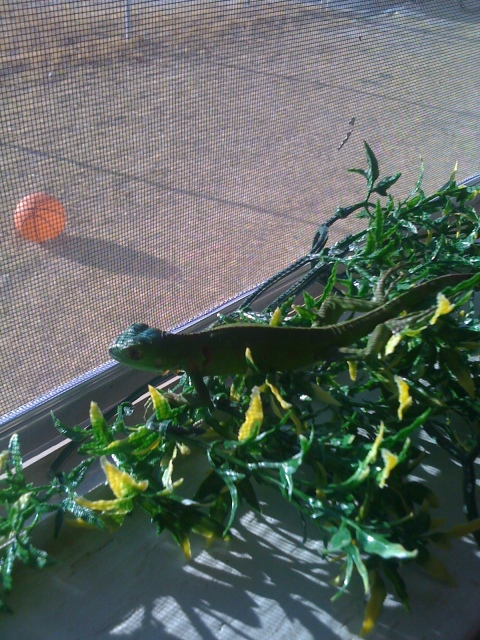 Igauana might have MBD
QuestionQUESTION: I have ordered the new light bulb and
Igauana might have MBD
QuestionQUESTION: I have ordered the new light bulb and
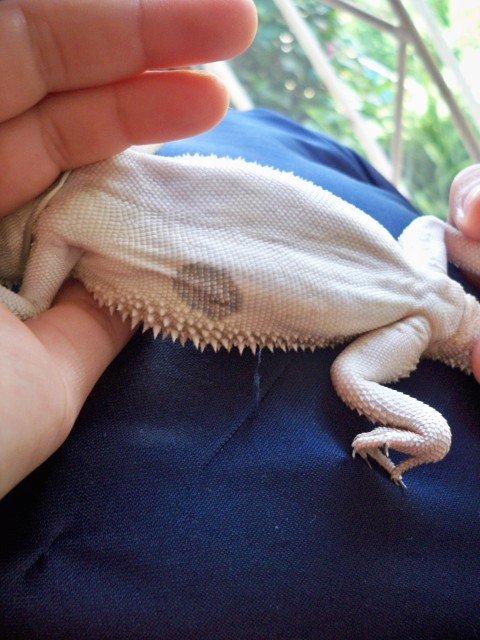 black patches on bearded dragon
QuestionQUESTION: I am worried because I have noticed t
black patches on bearded dragon
QuestionQUESTION: I am worried because I have noticed t
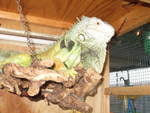 Large Iguana and asmtha
Question
JJ Watt
I have an adult Iguana that I h
Large Iguana and asmtha
Question
JJ Watt
I have an adult Iguana that I h
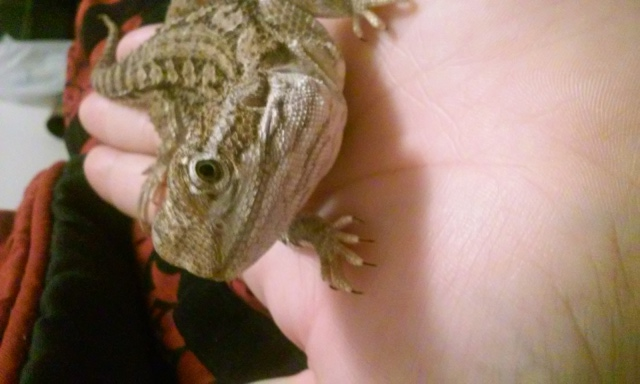 Rankin Dragon
Question
Joker
I have had my Rankin Dragon,Joke
Rankin Dragon
Question
Joker
I have had my Rankin Dragon,Joke
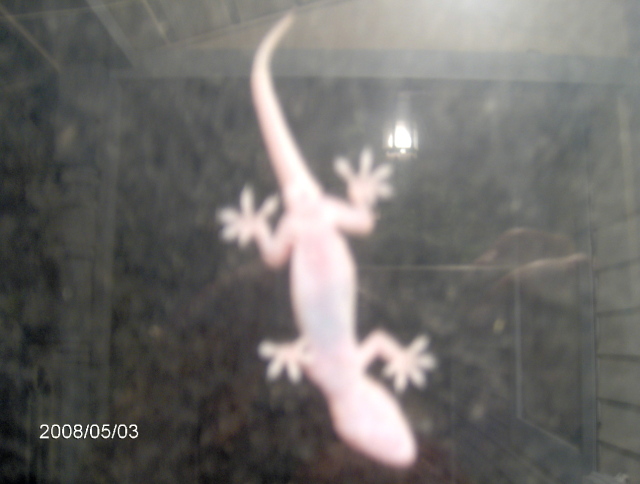 texas geckos changed from brown to colorless?
QuestionQUESTION: Hi,
Three years ago we had a f
texas geckos changed from brown to colorless?
QuestionQUESTION: Hi,
Three years ago we had a f